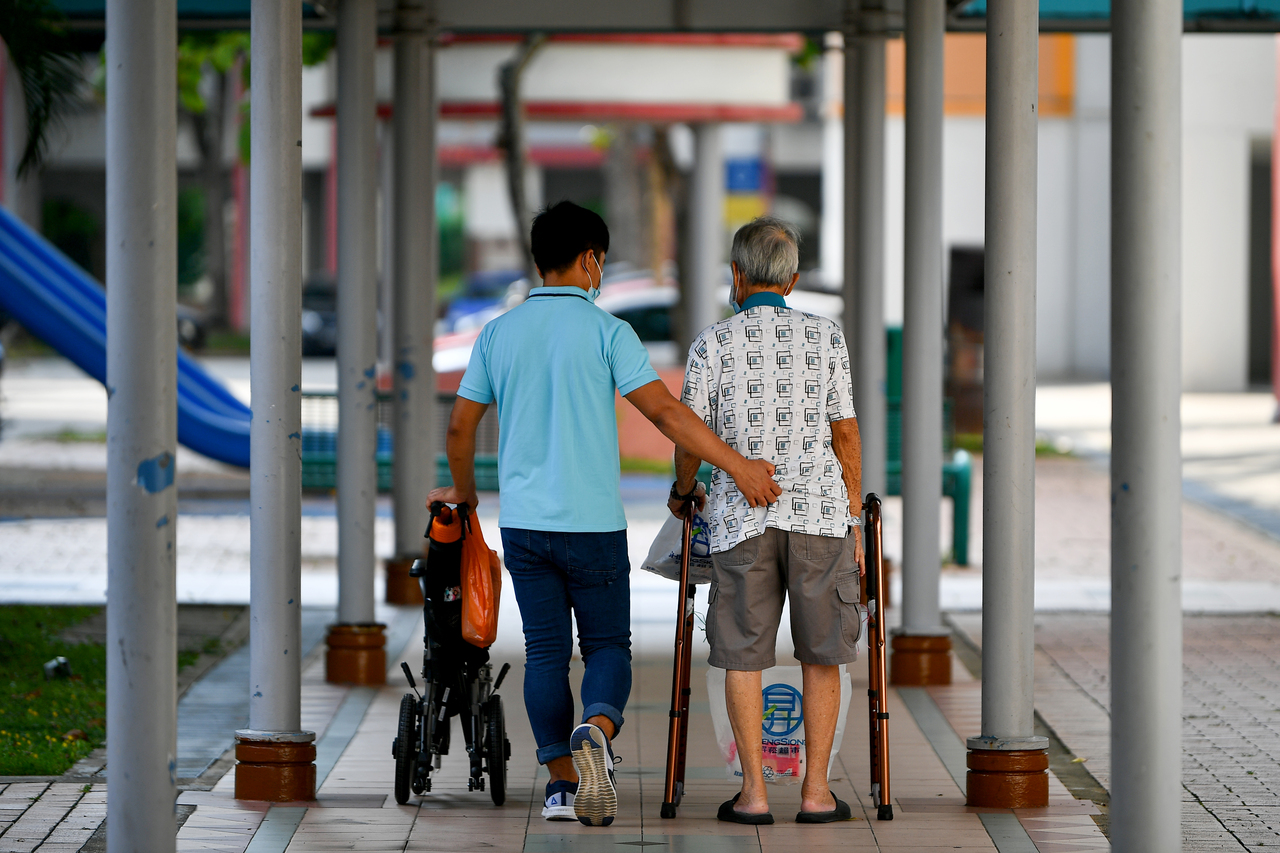Isolated seniors, overburdened caregivers linked to rise in elder abuse cases
Sign up now: Get ST's newsletters delivered to your inbox

Social workers and experts believe these two factors could have triggered a rise in abuse cases involving the elderly.
PHOTO: ST FILE
SINGAPORE - Some seniors have become isolated from their circle of friends while caregivers have had to take on increased responsibilities as a result of the Covid-19 pandemic.
Social workers and experts believe these two factors could have triggered a rise in abuse cases involving the elderly.
And with seniors being less active in the community and spending more time at home amid the coronavirus outbreak, more cases of neglect and self-neglect may also take place without family and friends noticing, they added.
Since the pandemic reached Singapore in early 2020, many people have worked and cared for their elderly parents from home, which led to ties suffering due to stress and frictions from being in close quarters for long periods, they said.
Elder abuse cases have been rising steadily in recent years, from 232 in 2019 to 283 in 2020 and 338 in 2021, Minister of State for Social and Family Development Sun Xueling said in Parliament earlier this month.
But higher-risk cases of elder abuse, neglect or self-neglect did not appear to have increased, she added.
There were 85 such cases in 2019, 71 in 2020, and 39 in the first nine months of 2021, she had said, citing cases taken up by community-based family violence specialist centres and Pave Integrated Services for Individual and Family Protection Specialist Centre.
Higher-risk cases with immediate danger and which require statutory protection under the Vulnerable Adults Act and the Women's Charter are typically handled by the Ministry of Social and Family Development's Adult Protective Service.
Social workers and experts told The Straits Times that caregivers had to take on more duties during the pandemic.
SMU sociology professor Paulin Tay Straughan said with elderly daycare centres closed during the outbreak, there was a lack of respite care options for caregivers.
"Due to social restrictions during the pandemic, much of the regular support system for seniors, which helps with the burden of caregivers, is absent," she added.
Such support would have come from seniors' relatives dropping by for a chat, their friends from the coffee shop checking in on them, or caregiver-senior pairs getting together to pass time, experts said.
Prof Straughan said wanting to protect seniors from Covid-19 may have the unintended consequence of cutting off their social support.
NUS associate professor of sociology Tan Ern Ser said caregivers may also have faced financial struggles due to the pandemic. Coupled with the stress from the disruptive effects of the outbreak at home, it could have led to caregivers taking out their frustration on seniors.
Poor parent-adult child relationships may also have contributed to the rise in elderly abuse, he added. "Having to take care of someone who is difficult to get along with and to whom one does not have much affection for, while feeling stuck with having to fulfil filial obligations can be rather painful."
The stress of caring for seniors can push some caregivers to the limit, experts said.
Ms Katherine Baptist, centre director of Montfort Care's Kreta Ayer Family Services, said: "Frustrated caregivers may lash out at seniors, scold, threaten or put them down, not realising that this may be abuse. The stress on caregivers may also be too much to bear, leading them to neglect the seniors, for instance, by not changing their diapers."
But the overall increase in elder abuse cases, with no rise in high-risk cases, might also indicate increased public awareness of what constitutes elder abuse and neglect, social workers said.
Ms Kristine Lam, lead social worker at Care Corner, said she saw a rise in reports of inappropriate care and neglect last year, rather than intentional abuse.
She cited the case of a caregiver with mild intellectual disability who could not meet his mother's higher care needs when her dementia deteriorated, resulting in her wetting herself as she was unable to use the toilet on her own.
Ms Baptist said: "When the plight of isolated seniors was spotlighted during the pandemic, we were able to pick up more cases upstream instead of downstream, before they turned high risk."
She encourages the public to report even suspected cases of abuse as some seniors do not file a report to protect their children.
Ms Lam said some seniors also keep mum because they are afraid of being abandoned or they wish to keep their living arrangement, even though it is harmful to them.
There are mechanisms in place to support vulnerable seniors. For instance, Touch Community Services has a helpline manned by healthcare specialists who inform residents of resources available in the community, said Mr Kavin Seow, senior director of the elderly group at the organisation.
Among the solutions suggested by social workers and experts are more respite care options, roping in neighbours to check in on seniors, providing financial support, training caregivers to care for seniors with ailments like dementia, and counselling to improve family relationships.
Mr Seow said awareness can also be further increased if residents are taught how to recognise signs of depression, spot someone with dementia or even how to support someone in a wheelchair.
Helplines
• National Care Hotline:
1800-202-6868 (8am - 8pm)
Mental well-being
• Institute of Mental Health’s Mental Health Helpline:
6389-2222 (24 hours)
• Samaritans of Singapore:
1800-221-4444 (24 hours) /1-767 (24 hours)
• Singapore Association for Mental Health:
1800-283-7019
• Silver Ribbon Singapore:
6386-1928
• Tinkle Friend:
1800-274-4788 and www.tinklefriend.sg
• Community Health Assessment Team:
6493-6500/1 and www.chat.mentalhealth.sg
Counselling
• TOUCHline (Counselling):
1800-377-2252
• TOUCH Care Line (for seniors, caregivers):
6804-6555
• Care Corner Counselling Centre:
1800-353-5800
Online resources


